A Dialogue with the Visual Arts
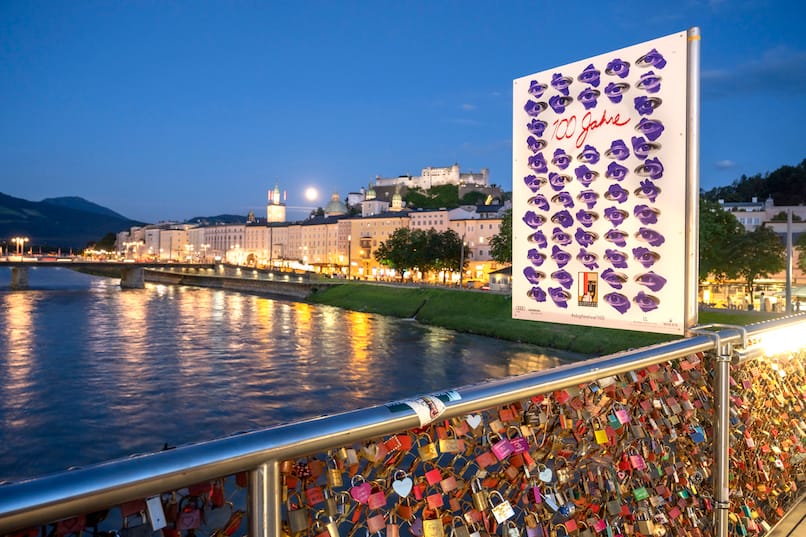
A poster series commemorating the Salzburg Festival’s centenary can be viewed since Friday and through the end of August on the Makartsteg bridge in Salzburg. Five international artists with a close connection to the Salzburg Festival have designed one poster each, exploring the founding idea of the Festival. “To awaken the ear, the eyes, human thought and intelligence,” this quote by the composer Luigi Nono could be called an imaginary inscription on the posters. The Spanish sculptor and artist Jaume Plensa, the German painter and sculptor Anselm Kiefer, the American stage director, playwright, painter, lighting designer, stage designer, video artist and architect Robert Wilson, the South African artist William Kentridge and the Austrian artist Eva Schlegel have each designed one poster.
The Salzburg Festival has always had a strong connection with the visual arts. This dialogue between the dramatic and the visual arts was continuously intensified from the 1950s onwards. Suffice it to mention Die Zauberflöte of 1955, to which Oskar Kokoschka contributed the set designs. Fritz Wotruba designed the sets for Oedipus in 1965. Jean Tinguely and Jean-Paul Chambas also designed major productions for the Salzburg Festival. Under the artistic leadership of Gerard Mortier, this dialogue with the visual arts grew even more intense, including Achim Freyer, Jörg Immendorff and Bob Wilson – and it continues to contribute to the dialogue of the arts to this day: Daniel Richter, Jonathan Meese, Rebecca Horn, Alfred Hrdlicka, Shirin Neshat and William Kentridge are only a few of the luminaries involved. Therefore, the idea of inviting outstanding artists to design posters for the Festival’s centenary suggested itself.
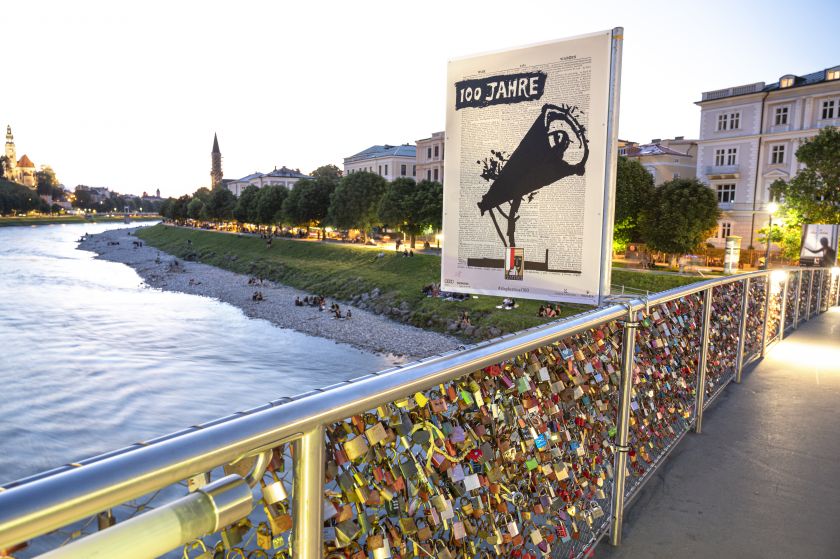
The South African artist William Kentridge staged Alban Berg’s Wozzeck for the Salzburg Festival in 2017, inviting the audience to enter his incomparable visual worlds including film, drawings and performance. For the anniversary, he designed the official 100-year logo. The subject of his poster refers both to his Wozzeck production and to the founding of the Salzburg Festival. In the upper left-hand corner, the word “WAR” appears, alluding directly to the founding of the Salzburg Festival shortly after World War I. The megaphone in the centre of the image is reminiscent of his Salzburg Wozzeck, which he set amidst the troubled times of World War I, but also of Nono’s quote which exhorts us to prick our ears.
The contribution by Bob Wilson is explicitly focused on the eyes, on seeing, on perception. The American artist contributed his suggestive lighting installations and characteristic 2 productions to the Mortier era: for example Bartók’s Bluebeard’s Castle and Schoenberg’s Erwartung featuring Jessye Norman, Debussy’s Pelléas et Mélisande and Büchner’s Dantons Tod. For the summer of 2020, the Salzburg Festival had originally planned to revive his staging of The Messiah, which had its premiere at this year’s Mozart Week.
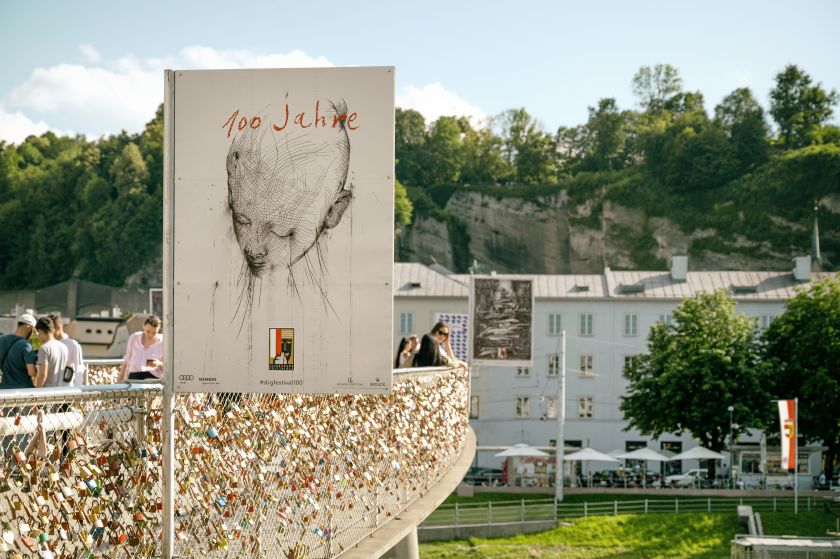
In his works, the Catalan artist Jaume Plensa explores the importance of literature and science for humankind. They often refer to open-mindedness and inner reflection. Plensa’s mysterious sculpture at “Dietrichsruh” in Salzburg is widely known – at the Festival, he contributed to a spectacular production of Berlioz’ La Damnation de Faust together with the artist collective La Fura dels Baus at the Felsenreitschule in 1999.
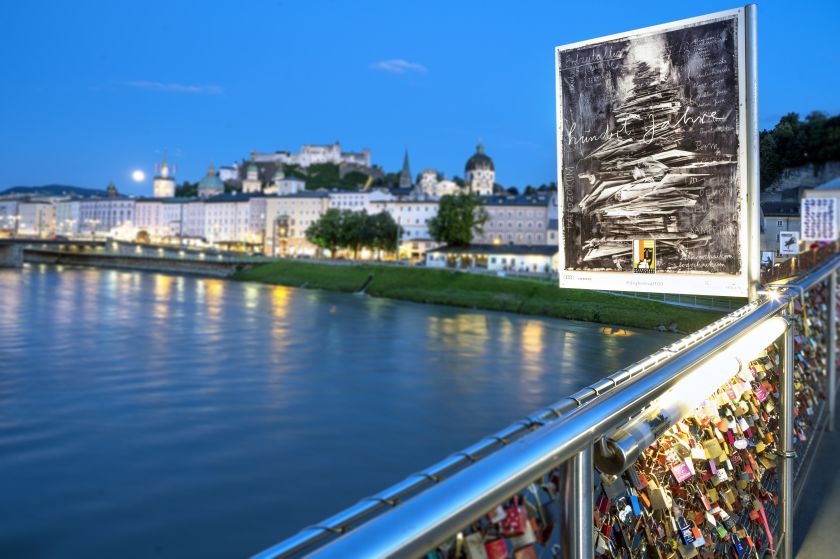
The art projects of the Salzburg Foundation have also ensured the public presence of the German-Austrian artist Anselm Kiefer in Salzburg: his installation A.E.I.O.U. is located inside the pavilion right across from the Festspielhaus. His contribution to the Festival’s centenary is also about retrospection – about, in his own words, “the visualization of sedimentation and renewal in artistic creativity”.
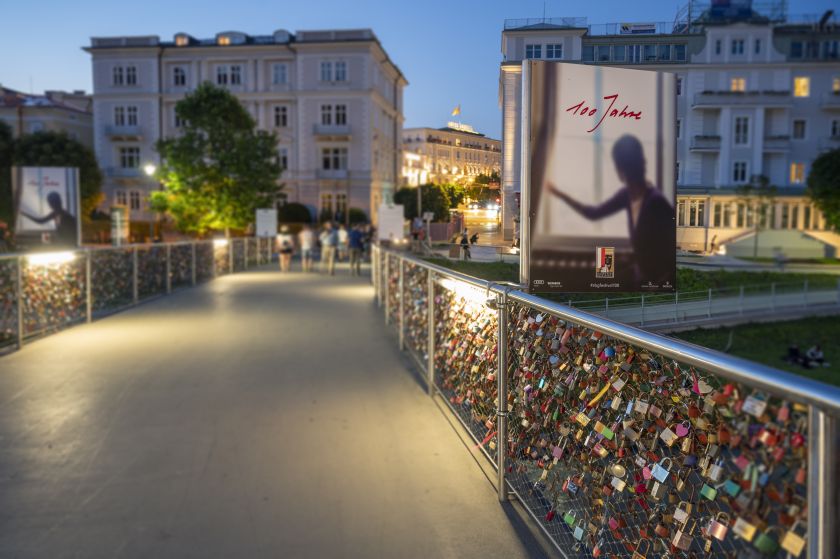
Last but not least, Eva Schlegel opens the windows, broadening our gaze towards the future – hopefully a bright future. Eva Schlegel has also designed a contribution to the State Exhibition Great World Theatre – 100 Years of the Salzburg Festival at the Salzburg Museum, exploring the complex relationship between words and writing, with a special focus on Austrian playwrights. This is not the first time the Austrian artist has worked for the Salzburg Festival: for the 2013 Festival summer, she created an installation at the Karl-Böhm-Saal and in the foyer of the Haus für Mozart and also designed the programme preview.






